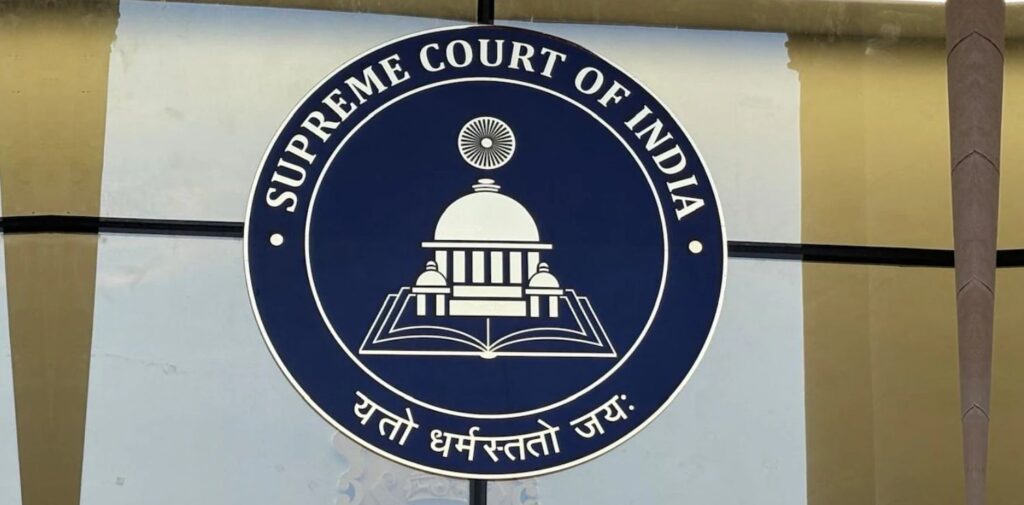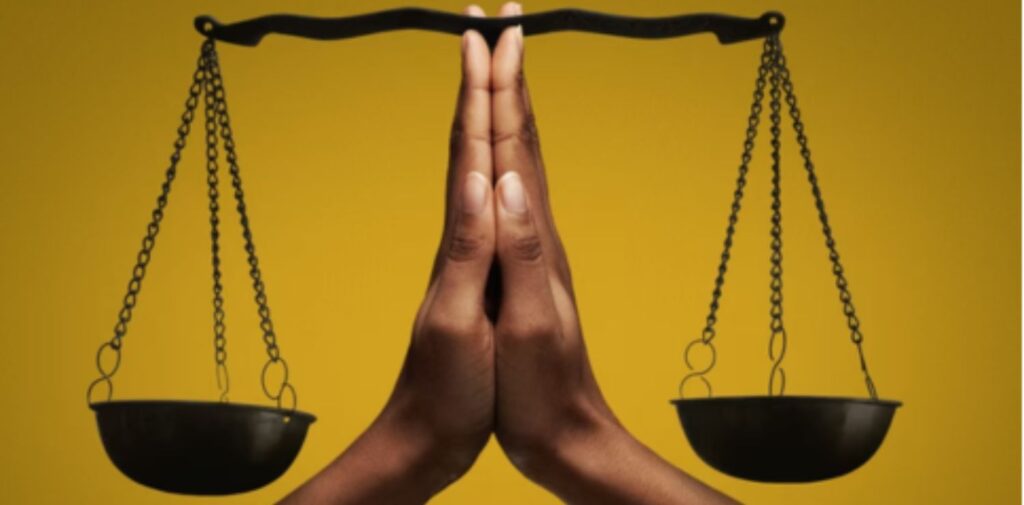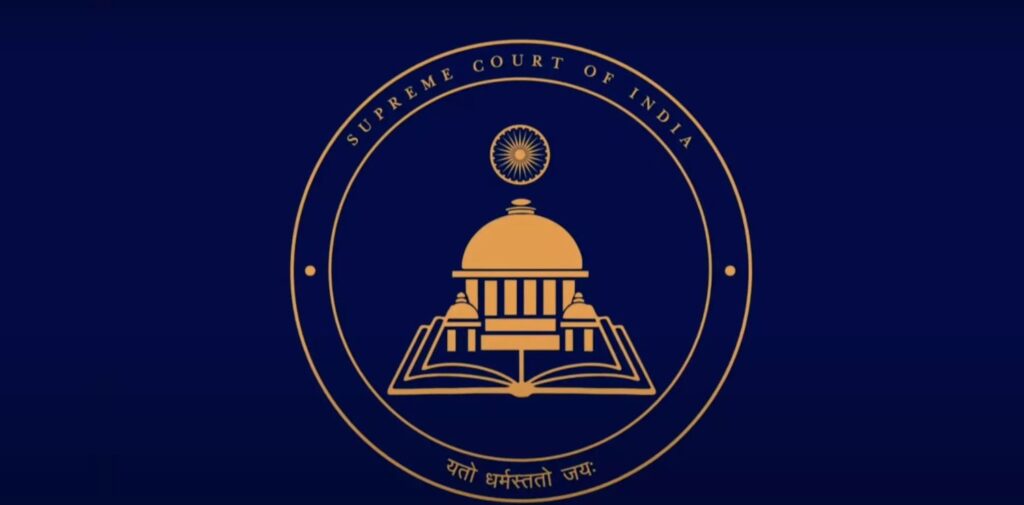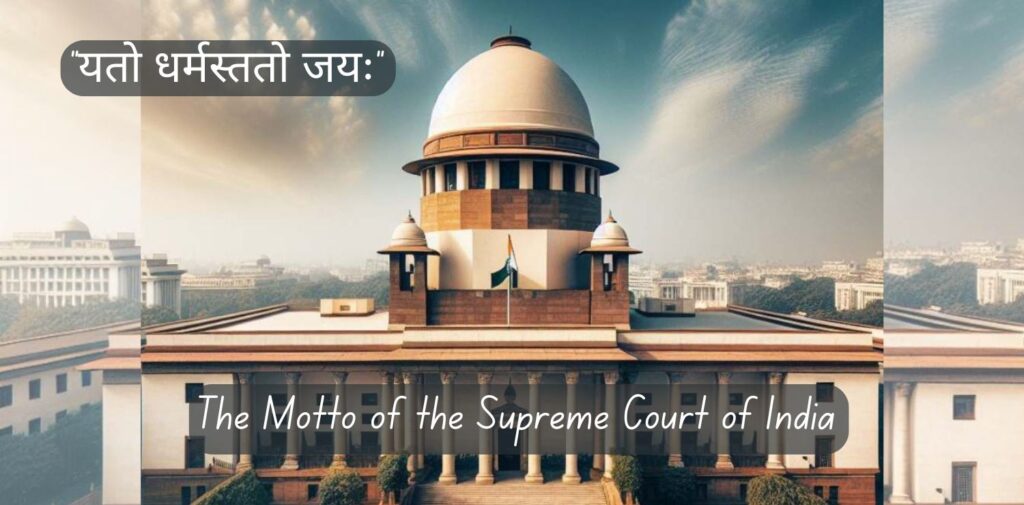The phrase “यतो धर्मस्ततो जयः” (Yato Dharmastato Jayaḥ) translates to “Where there is righteousness, there is victory.” This powerful motto holds significant importance in the context of the Indian judiciary, particularly as the guiding principle of the Supreme Court of India.
Origins of the Verse
The phrase originates from the Mahabharata, one of the most revered texts in Indian literature. Specifically, it is found in the Anushasana Parva (Book of Instructions). The Mahabharata narrates complex tales of duty (dharma), moral dilemmas, and the consequences of actions taken by its characters. This context highlights the significance of adhering to dharma in achieving justice and righteousness.

Significance for the Supreme Court
The Supreme Court of India, established in 1950, is the highest judicial forum and final court of appeal under the Constitution of India. Its motto, “यतो धर्मस्ततो जयः,” encapsulates the core values of justice, integrity, and righteousness that the court strives to uphold.
By adopting this motto, the Supreme Court emphasizes that its decisions are grounded in the principles of justice and ethics. It serves as a reminder that true victory in the legal realm comes from upholding the rule of law and ensuring that justice is served fairly and impartially.
Role of Dharma in Justice
In the Indian context, dharma encompasses a range of ethical obligations that individuals and institutions must adhere to. For the Supreme Court, this means interpreting laws in a manner that aligns with justice and the moral fabric of society. The court’s role is not just to adjudicate disputes but also to ensure that the principles of fairness and equity prevail.
For instance, landmark judgments by the Supreme Court, such as those affirming fundamental rights and addressing social justice issues, reflect the application of dharma in the judicial process. These decisions underscore the belief that justice must be accessible to all, promoting equality and protecting the rights of the marginalized.

Historical Context
The motto was adopted during a time when India was establishing its legal framework post-independence. The founders of the Constitution envisioned a judiciary that would safeguard the rights of citizens and act as a check on the powers of the government. The phrase “यतो धर्मस्ततो जयः” embodies this vision, serving as a guiding light for the Supreme Court as it navigates complex legal landscapes and societal challenges.
Examples of Its Application
One prominent example of the Supreme Court applying the ethos of “यतो धर्मस्ततो जयः” can be seen in cases involving fundamental rights. For instance, in the Kesavananda Bharati case (1973), the Supreme Court ruled on the Basic Structure doctrine, asserting that certain fundamental rights cannot be amended by the legislature. This landmark decision exemplified the court’s commitment to preserving the core values of justice and democracy, ensuring that the principles of dharma are upheld within the framework of governance.
Another significant case is the Navtej Singh Johar vs. Union of India (2018), where the court decriminalized Section 377 of the Indian Penal Code, which criminalized consensual same-sex relationships. The ruling was rooted in the principles of equality and individual rights, showcasing how the Supreme Court applies the motto to protect marginalized communities and uphold social justice.
Modern Relevance
In today’s context, “यतो धर्मस्ततो जयः” remains a relevant and powerful reminder for the judiciary and society alike. As India grapples with issues such as corruption, human rights violations, and social inequalities, the principles embedded in this motto encourage both the judiciary and the citizens to pursue justice through righteousness.
The Supreme Court’s commitment to this motto also instills confidence in the legal system. It reassures citizens that their grievances will be addressed fairly, reinforcing the belief that righteousness in the legal process ultimately leads to a just society.

Conclusion: “यतो धर्मस्ततो जयः”
The motto “यतो धर्मस्ततो जयः” serves as a profound reminder of the Supreme Court of India’s mission to uphold justice and righteousness in the legal system. It reflects the court’s dedication to interpreting laws in a manner that aligns with ethical principles, ensuring that every individual’s rights are protected.
As we continue to navigate the complexities of modern society, let this motto inspire us to advocate for justice in our own lives. By embodying the principles of dharma, we contribute to a society where righteousness prevails, reinforcing the belief that true victory is achieved when justice is upheld for all.




